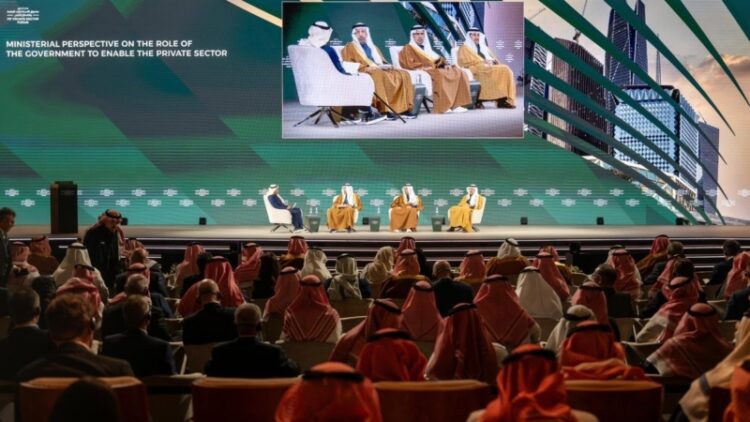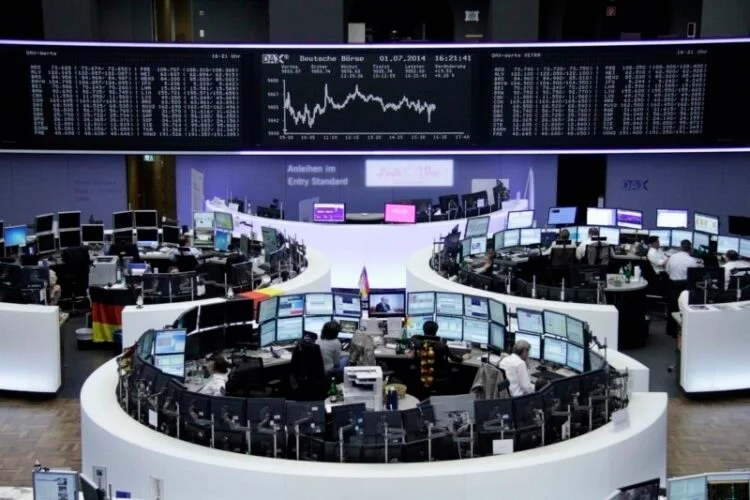Publisher: Maaal International Media Company
License: 465734
In 1st day of PIF Forum: Balance of foreign investment in the Kingdom doubled to 900 billion riyals
اقرأ المزيد
The first day of the Public Investment Fund and Private Sector Forum witnessed a series of dialogue sessions and discussions that highlighted the role of the Fund in supporting the national economy, stimulating investment, and empowering the private sector through major investment opportunities in various sectors.
In his opening remarks, Yasir Al-Rumayyan, Governor of the Public Investment Fund, confirmed that spending on local content through the fund and its portfolio companies between 2020 and 2023 reached approximately 400 billion Saudi riyals, supported by the “Musahama” program launched by the fund to develop local content, and what accompanied it, which contributed to an increase in the percentage of local content in the fund and its companies from 47% in 2020 to 53% in 2023. He also emphasized the role of the “Private Sector Platform” affiliated with the fund in stimulating and attracting investments in the entire value chain, while providing investment opportunities worth an estimated 40 billion Saudi riyals.
He emphasized the Fund’s commitment to its role as a major driver of economic growth, noting that cooperation with the private sector is the cornerstone of achieving the goals of Saudi Vision 2030. The forum witnessed important announcements of strategic partnerships, a review of the Fund’s achievements in supporting local content, in addition to signing new agreements in vital sectors such as manufacturing, transportation, and energy. A number of ministers and executives also reviewed their plans to enhance the private sector’s contribution to economic development, emphasizing the pioneering role it plays in achieving economic transformation. The forum was not just a dialogue platform, but a space to showcase actual investment opportunities, as new projects were revealed, and ambitious initiatives were launched that enhance integration between the public and private sectors, and open the way for local and international investments. Jerry Todd, Head of National Development at the Public Investment Fund, emphasized the commitment of the Public Investment Fund and its portfolio companies to empowering the private sector and driving its business growth and contribution to the development and diversification of the economy, noting that the Public Investment Fund and Private Sector Forum, with its development and growth over the course of the three editions, clearly reflects this commitment and its positive results. Todd explained that the current edition includes more business opportunities available to the private sector and local suppliers, presented by 100 of the Fund’s portfolio companies participating in the forum, in addition to a group of specialized workshops aimed at enhancing knowledge and expertise about local supply chains and their requirements for promising sectors, including the automotive and mobility sector, and logistics services.
He spoke about the Fund’s initiatives to enhance business skills and efficiency, referring to the Industrial Business Accelerator Program launched by the Fund in September 2024 with the aim of enabling emerging manufacturing companies to develop competitive and innovative products and services and grow their businesses, and witnessed the participation of 13 emerging, small and medium-sized companies, through which 12 agreements were signed with the Fund’s portfolio companies, and 7 memoranda of understanding are currently being signed, and a number of new markets were opened for export. He also touched on the “Contribution Design Competition” initiative aimed at enhancing the use of local content, and witnessed the participation of 373 emerging Saudi architects from 24 universities, and 160 emerging design companies from all over the Kingdom.
In a ministerial session on public-private partnerships, titled “Ministerial Vision for the Government’s Role in Supporting and Empowering the Private Sector,” Majid bin Abdullah Al-Hogail, Minister of Municipal and Rural Affairs and Housing, Eng. Saleh bin Nasser Al-Jasser, Minister of Transport and Logistics, and Eng. Khalid Al-Falih, Minister of Investment, discussed the vital role of the private sector in government strategies, reviewing successful experiences in public-private partnerships at various levels.
Al-Falih touched on the pioneering experience of the Public Investment Fund in achieving economic impact and empowering the private sector, noting that the fund has become a model that major global economies aspire to emulate after the great positive transformation achieved by the Kingdom’s economy, by raising the share of non-oil activities in the economy to 52% of the total size of the economy, which today exceeds 4 trillion riyals, stressing that the success came thanks to working within the framework of Saudi Vision 2030, the combined efforts of all sectors, and the leading role of the private sector in the economy.
His Excellency pointed out that the economic activity in the Kingdom has led to a significant increase in the interest of international investors in the Kingdom’s economy and private sector, as the number of foreign investor licenses has increased from 4,000 licenses in 2019 to 40,000 licenses today, and the number of companies with regional headquarters in the Kingdom has increased to 600 companies, the latest of which is Nokia, which intends to manage many of its global activities from Riyadh. In addition, the balance of foreign investment has doubled compared to what it was before the vision to reach 900 billion riyals, and the flow rate has increased threefold, concluding by saying: “We are in the phase of Saudi Vision 2030, and the Fund is the locomotive for the sectors.”
For his part, Al-Hogail said that urban planning that keeps pace with economic diversification efforts and attracting investors has contributed significantly to increasing the role of the private sector and strengthening its position in this framework, adding that the municipal and housing sector now represents more than 16% of the real GDP in 2024, while the real estate and construction sector attracts more than 16% of foreign investment flows. Al-Hogail pointed out that investments in the housing sector in partnership with the private sector exceeded 200 billion riyals during the past three years, and the number of job opportunities created by the civil and housing sector reached more than 500 thousand jobs.
As for Al-Jasser, he stated that 80% of the targeted investments in the transportation and logistics sector will come from the private sector, pointing to new partnerships that have been signed worth more than 18 billion riyals in airports and ports, with great interest shown by the private sector in ports to benefit from the great potential of the sector in the Kingdom. Al-Jasser revealed that there are 4 airports offered to the private sector, the first of which is Abha Airport, which attracted more than 100 Saudi and international alliances, six of which reached the final selection stages. The list of other airports offered includes Qassim, Hail and Taif airports.
The air transport sector grew by 26% during 2023 and by 15% in 2024, while the number of air transport destinations increased by 50% compared to the period prior to 2021, which witnessed the launch of the National Strategy for Transport and Logistics Services, attributing this rapid growth to the efforts led by the private sector. The “Auto Connect” Vehicle and Mobility Zone, which includes the forum for the second year, witnessed the attendance of Their Excellencies the Ministers, along with officials from relevant government agencies, and representatives of the private sector, for the main workshops hosted by the zone to introduce the system and requirements of supply chains necessary to support the development and growth of the vehicle and mobility sector in the Kingdom, and to ensure the empowerment and enhancement of the participation of the private sector and local suppliers in achieving this development and growth. During workshops titled “Exploring the Vehicle Sector in the Kingdom,” Dr. Khalid Al-Jahrash, Head of Sector Development at the National Development Department at the Public Investment Fund, reviewed the Fund’s investment journey in the vehicle and mobility sector, which began in 2018 by investing in Lucid Electric Cars, then announcing “Seer,” the first electric vehicle manufacturing brand in the Kingdom, partnering with Hyundai and then Pirelli, the global tire company, to localize the automotive accessories industry in the Kingdom, launching an electric vehicle infrastructure company (EVIQ) to contribute to developing the infrastructure system for charging electric vehicles, and then launching the National Company for Investment in the Automotive and Mobility Sector (TASARA’) to facilitate the technical transformation and enhance the investment environment in the sector.
Al-Hajrash said: “The Fund is committed to investing SAR 35 billion to develop and localize an integrated automotive manufacturing system in the Kingdom, and enhance the participation of the local private sector in manufacturing and supply, in addition to investing in developing and enhancing the skills of Saudi cadres to meet the demand created by this growing system for highly skilled technical competencies, through the National Academy for Cars and Vehicles (NAVA), which attracted 200 Saudi youth in its first batch. For his part, the Deputy Minister of Industry and Mineral Resources for Industry Affairs, Eng. Khalil bin Salamah, pointed out the progress made by the Kingdom over the past years in the automotive manufacturing sector and its related supply chains, including the localization of four original parts manufacturers and eight key supply companies, in addition to the launch of the “National Academy for Cars and Vehicles”, stressing that the Ministry of Industry and Mineral Resources continues to cooperate with all stakeholders to enhance the capabilities of local suppliers, enhance competitiveness, and develop original manufacturing to serve the development and progress of the sector.
The Auto Connect sessions witnessed the signing of 23 agreements and memoranda of understanding between several of the fund’s portfolio companies and local private sector companies. In a session titled “Leading the Transformation in Global Industries to Build a Better Tomorrow,” Amit Midha, CEO of Saudi “Alat,” said that the Kingdom is establishing, through research and development efforts, new models of artificial intelligence and the pillars of the knowledge economy, adding that the Kingdom has many competitive advantages in terms of energy and investment capacity, which “Alat” seeks to benefit from to contribute to making the Kingdom a global leader in this sector. Midha revealed that the Kingdom will export robots to the world next May, and they will be robots designed and manufactured entirely in the Kingdom, expecting that this will pave the way for a major global transformation. Bert Wilt, CEO of Maaden, spoke in a session titled “The Main Driver of Growth of the Modification Sector in the Kingdom,” stressing the importance of sustainability in the company’s work and its vital role in achieving the goals of Saudi Vision 2030, considering mining as the third sector in the local economy. Wilt said that the company will enter the copper mining phase in the coming period, in addition to continuing its efforts to explore and mine many other minerals that the Kingdom is rich in, adding that the company uses technology and artificial intelligence to reduce the time taken between prospecting for minerals and extracting them, noting that the company continues to work on increasing its contribution to local content, which has reached 57% today.
In a session on the vehicle manufacturing sector in the Kingdom, James DeLuca, CEO of “Seer” Cars, the first Saudi national car brand, spoke, confirming that the company will launch two new models later this year, revealing that the number of the company’s employees continues to grow to keep pace with the speed of progress in business. DeLuca spoke about the widespread use of technology in production work, allowing the provision of more than 30 colors for its cars, and the company will focus on matching the features of its cars with customer preferences.
In a session on the future of the aviation sector in the Kingdom, Tony Douglas, CEO of Riyadh Aviation, pledged to make the process of purchasing tickets, making payments and conducting transactions easier for travelers, by using technologies such as facial recognition, adding that the company will prioritize the local private sector in its operations.
Douglas said that Riyadh Aviation has already concluded several deals with local fuel and services companies, and will continue to work with small and medium-sized enterprises to support its operations in more than 100 cities around the world by 2030. The sessions were then followed by companies from the Public Investment Fund’s portfolio, with Fahad Al-Shebel, CEO of “Nubco”, speaking, revealing that the total value of Nubco’s contribution through private sector partnerships in 2024 amounted to 3.2 billion Saudi riyals, and expressed his optimism about the future of the Kingdom’s economy, pointing to statistics indicating that 89% of Saudi CEOs are optimistic about growth prospects in the coming year. In a session titled “Empowering the National Biotechnology Sector”, the role of Livera in transferring and localizing knowledge and technology related to pharmaceutical manufacturing in the Kingdom, especially bio-vaccines, was reviewed, as well as its strategy to localize and ensure the sustainability of local supply chains for insulin through local manufacturing and production, and how this achievement contributes to stimulating investment in new areas of the healthcare sector, whether in manufacturing or supply chains, in addition to its contribution to enhancing healthcare levels in the Kingdom.
The supply chain session was attended by Eng. Rayan Al-Maabdi, Director of the Services Sector and National Development Management Department at the Public Investment Fund, Ali Ayoub, CEO of the investment portfolio at Vision Invest, Huda Al-Lawati, Founder and CEO of Alif Capital, and Jessica Wong, Founder and Managing Director of EW Partners. The speakers focused on how to advance in localizing supply chains, highlighting how to enhance the development of supply chain infrastructure and local factors that lead to creating incentives to establish new supply chains. During the closing session of the first day of the forum, Barbara Bozic, CEO of Tourism Experiences at Cruise Saudi, highlighted the contribution of innovative tourism projects to supporting the growth and development process witnessed by the Kingdom, reviewing the new tourism experiences offered by Cruise Saudi.








